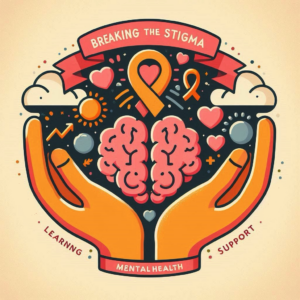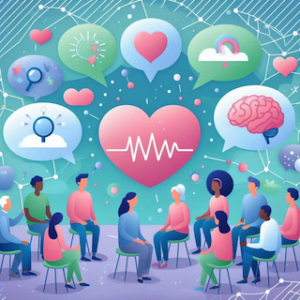Mental health stigma prevents many from seeking help due to fear and judgment, worsening their struggles. Open conversations, education, and support are essential to reducing stigma, promoting understanding, and encouraging access to mental health resources for better well-being.
Breaking the Stigma: The Importance of Normalizing Mental Health Conversations
Mental health is a subject that has often been misunderstood or treated as a taboo topic. This has caused many individuals facing mental health challenges to feel ashamed, isolated, or even afraid to seek help. These feelings are often worsened by the stigma surrounding mental health, which creates negative perceptions and stereotypes about those who experience mental health conditions. However, times are changing, and more people are speaking up and advocating for greater awareness and understanding of mental health issues. Let’s explore what mental health stigma is, why it is so harmful, and how we can work together to break it. We’ll also look at the importance of open conversations about mental health and how to access resources and support when it’s needed.
What is Mental Health Stigma?

Mental health stigma refers to the negative and often unfair attitudes or beliefs about individuals who experience mental health conditions. This stigma is rooted in harmful stereotypes that suggest mental health issues are signs of weakness or personal failure. As a result, many people with mental health conditions, such as depression, anxiety, or trauma, may feel judged, misunderstood, or even discriminated against.
The effects of stigma can be deeply isolating. Many individuals are afraid to talk about their struggles or seek help out of fear of being labeled or shamed. This can delay treatment, increase feelings of loneliness, and make recovery even harder. For example, someone dealing with anxiety might avoid social situations or important conversations about their well-being because they worry others will see them as weak or incapable.
It’s crucial to understand that mental health conditions are just as real and valid as physical health conditions. They are not choices or character flaws but medical issues that require care, support, and understanding.
Why is Breaking the Stigma Important?

Breaking the stigma around mental health is essential because it opens the door for more people to seek the help they need without fear or shame. When we reduce stigma, we create an environment where mental health is treated with the same importance as physical health. This helps people feel more comfortable discussing their challenges, asking for support, and finding the right resources.
Normalizing mental health conversations can also foster greater understanding. When we talk openly about these issues, we educate ourselves and others about the realities of mental health conditions. This understanding can lead to stronger support systems within families, schools, workplaces, and communities.
Reducing stigma can also have a ripple effect. As more people feel comfortable speaking out and seeking help, others who may still feel hesitant or uncertain can gain the courage to do the same. By breaking down barriers, we can help ensure that everyone has access to the care they need.
How Can We Break the Stigma?

While breaking the stigma surrounding mental health may seem challenging, small steps can make a big difference over time. Here are some practical ways to help shift attitudes and promote understanding:
Talk openly about mental health:
Discussing mental health should feel as natural as talking about physical health. Whether it’s sharing personal experiences or checking in with a friend, open conversations can normalize these topics and show that it’s okay to seek help.
Educate yourself and others:
Take the time to learn about different mental health conditions, such as depression, anxiety, trauma, and personality disorders. Sharing accurate information can help dispel myths and replace stereotypes with compassion and understanding.
Encourage and share personal stories:
If you feel comfortable, share your own experiences with mental health challenges. Personal stories have the power to inspire, connect, and show others that they’re not alone. They also help to counteract negative stereotypes.
Advocate for mental health support:
Speak to local leaders, organizations, or policymakers about the importance of mental health care. Advocate for better access to resources, funding for mental health programs, and support systems in schools and workplaces.
Show kindness and empathy:
If someone you know is struggling, listen without judgment and offer encouragement. Small gestures of understanding can make a significant impact.
Why Are Mental Health Conversations Important?

Open conversations about mental health are crucial because they help normalize these issues and create a safe space for people to share their feelings. When mental health is treated as a natural part of overall well-being, it reduces the fear and stigma that often prevent individuals from seeking help.
Talking about mental health also promotes early detection of issues. By recognizing the signs of mental illness in ourselves or others, such as changes in mood, sleep patterns, or energy levels, we can encourage timely intervention. Early support can make a big difference in someone’s recovery journey.
Beyond individual benefits, open conversations can strengthen communities. They encourage understanding and empathy, which help build stronger support networks and reduce feelings of isolation.
How to Access Mental Health Services

If you or someone you care about is experiencing mental health challenges, it’s important to know that help is available. While finding the right resources might feel overwhelming, taking the first step is often the hardest but most important part. Here are some ways to access mental health services:
Talk to your doctor:
A primary care doctor can assess your mental health, provide initial support, and refer you to a mental health professional if needed.
Check your insurance plan:
Find out which mental health services are covered under your insurance plan. This can help you locate professionals or organizations that fit within your budget.
Use online tools:
Many websites and apps are designed to connect individuals with mental health professionals or provide self-help resources. Look for reliable options that meet your specific needs. Be cautious about online subscription services as these may not adhere to the same standards as other mental health services.
Reach out to local organizations:
Community mental health centers, nonprofit organizations, and support groups often provide valuable resources, information, and affordable care options.
Don’t hesitate to ask for help:
Reaching out for support is a brave and important step toward recovery. Whether it’s through a professional counselor, a trusted friend, or a family member, letting someone know about your struggles can make a world of difference.
Remember, mental health is just as important as physical health. Together, we can create a world where seeking help and talking about mental health is seen as a sign of strength—not weakness. Everyone deserves to feel supported and cared for on their mental health journey.










